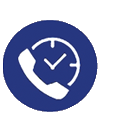If you have children or have taken children into your household, you can receive child benefit under certain conditions. Child benefit is paid for all children up to the age of 18. After the age of 18, you are only entitled to child benefit under special conditions.
Child benefit is paid to exempt parental income from tax in the amount of a child's minimum subsistence level. The minimum subsistence level also includes the child's needs for care and education or training. If the child benefit goes beyond this, it serves to support families.
In the current calendar year, child benefit is initially paid as a tax allowance. The tax allowances for children are generally not taken into account when deducting income tax. When assessing income tax, the tax office subsequently checks whether the tax exemption for the child's minimum subsistence level has actually been achieved through the payment of child benefit. If this is not the case, the tax-free allowances for children are deducted and the child benefit due is added to the standard rate of income tax. This applies even if no child benefit has been claimed, as the entitlement to child benefit is the only factor that matters for this favorable assessment.
Note
Further information for those entitled to child benefit and on the subject of child benefit.






